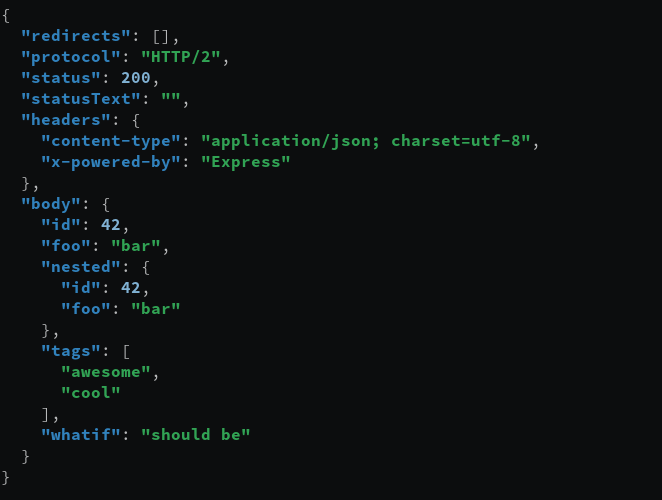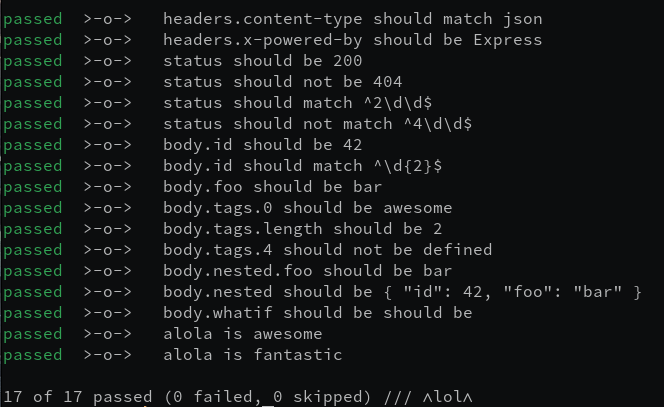2-in-1 cli tool for JSON API
- converts
curl -Lisoutput into JSON (protocol,status,statusText,headers,body, andredirects) - test-runner with 'battery-included' assertions
npm install -g alola
# or even better
npx alolacurl -Lis <url> | npx alolacurl -Lis http://dummy.restapiexample.com/api/v1/employee/1 | npx alola{
"redirects": [],
"protocol": "HTTP/1.1",
"status": 200,
"statusText": "OK",
"headers": {
"cache-control": "no-cache, private, max-age=31536000",
"content-type": "application/json",
"date": "Mon, 14 Sep 2020 11:02:10 GMT",
"display": "staticcontent_sol",
"expires": "Tue, 14 Sep 2021 11:02:09 GMT",
"host-header": "c2hhcmVkLmJsdWVob3N0LmNvbQ==",
"referrer-policy": "",
"response": "200",
"server": "nginx/1.16.0",
"vary": "Accept-Encoding,User-Agent,Origin",
"x-ezoic-cdn": "Miss",
"x-middleton-display": "staticcontent_sol",
"x-middleton-response": "200",
"x-ratelimit-limit": "60",
"x-ratelimit-remaining": "58",
"x-sol": "pub_site",
"content-length": "179"
},
"body": {
"status": "success",
"data": {
"id": 1,
"employee_name": "Tiger Nixon",
"employee_salary": 320800,
"employee_age": 61,
"profile_image": ""
},
"message": "Successfully! Record has been fetched."
}
}alola comes with assertion capability in order to make some checks on json.
- reports the result with details
- no bail-out; it runs every assertions
- CI-friendly: process exit code is always the number of failed testcases
curl -Lis http://dummy.restapiexample.com/api/v1/employee/1 \
| alola \
'status should not be 404' \
'headers.content-type should match json' \
'body.status should be success' \Another example see e2e.sh
alola offers a high-level api for assertions using 'human-language' to make checks easy to read and write. It means instead of writing functions, you literally write down your expectation.
In most cases you do not have worry about the quotes or escaping issues.
<key> <verb> <expectation>
-
keyis a value selector on the input json.
example:status,body.members.0.id,headers.x-powered-by,whatever.my.json.structure.is -
verbis a specific 'trigger phrase' which tells alola what to do. -
expectationis any kind of expected value, depending on verb.
-
should beorshould not beit checks explicit the actual value with the expected value
'status should be 200' # assert.deepStrictEqual(json.status, 200) 'status should not be 404' # assert.deepStrictEqual(json.status, 200) 'body should be {"name": "John Doe", "age": 42}' # assert.deepStrictEqual(json.body, {"name": "John Doe", "age": 42})
-
should matchorshould not matchinstead of explicit check, you can pass a regex as expectation
'status should match 2\d\d' # will pass when status is "ok" 'status should not match 4|5\d\d' # will pass when status is neither client nor server error
In some case you might want to define your own assertions.
The only thing you have to do: create an .alola.js file in your project directory and export an object with the following structure:
// .alola.js
module.exports = {
'status is ok-ish': (json, assertion) => {
const status = json.status.valueOf();
if (status >= 200 && status < 300) return;
throw new Error(`${status} is not ok.`);
},
'this is an optimistic check': (json, assertion) => {
console.log({ json, assertion }); // inspect the paramters
return;
},
'you can define (some|any|few) regex as well': (json, assertion, regex) => {
console.log({ json, assertion, regex }); // inspect the paramters
return;
},
};Example: \
curl -Lis http://dummy.restapiexample.com/api/v1/employee/1 \
| alola \
'status should not be 404' \
'status is ok-ish' \
'this is an optimistic check' \
'you can define some regex as well' \
'you can define any regex as well'
The keys of this object are your own custom assertions, and it should implement a function. This assertion function get 2 parameters:
- the
jsonitself - the
assertionwhich triggered this execution
If the custom assertion contains any regex, a third parameter will be passed to the function, which contains a pattern and a match key-value.
patternis your regexmatchthe result of the pattern regex
You can configure the alola function with environment variables
| Environment variable | Description | Default value | Possible values |
|---|---|---|---|
ALOLA_REPORT |
result reporter | text | text,json,silent |
ALOLA_CUSTOM |
any resolvable path to the custom assertions | ./.alola.js |
balazs4 - https://twitter.com/balazs4





